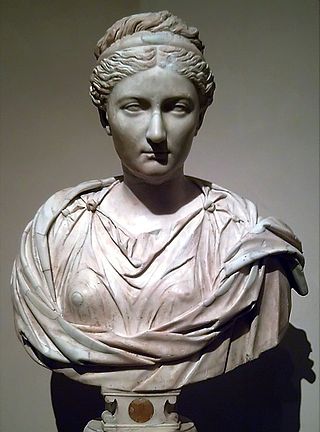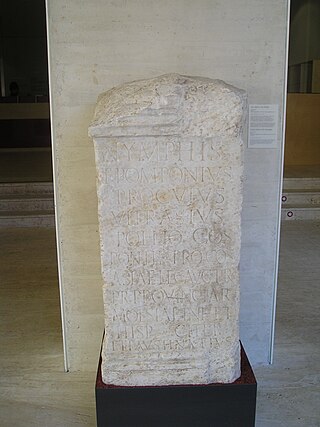Descent and family
Severus Proculus was of noble descent, born in a wealthy and prominent family in Pompeiopolis, a city in the Roman province of Galatia. He was the son of the Pontian Greek Senator and Peripatetic philosopher, Gnaeus Claudius Severus, and his second wife, the princess Annia Galeria Aurelia Faustina, daughter of Marcus Aurelius. He had a paternal half-brother called Marcus Claudius Ummidius Quadratus, from his father's first marriage, who was adopted by Marcus Ummidius Quadratus Annianus, consul in 167, a nephew of Marcus Aurelius.
His paternal grandfather, Gnaeus Claudius Severus Arabianus, was also a Senator and Peripatetic philosopher, and one of the teachers of Marcus Aurelius, whom he later befriended. His maternal grandparents were Marcus Aurelius and Faustina the Younger. Through his mother, Severus Proculus was a relative to the ruling Nerva–Antonine dynasty of the Roman Empire and among his maternal aunts and uncles were the Empress Lucilla and Emperor Commodus.
Life
Severus Proculus was born and raised in Pompeiopolis. It is unknown whether he ever followed the philosophy of his father and grandfather.
It appears that Severus Proculus wasn't involved in any of the several plots to kill or overthrow Commodus. By the time his maternal uncle was assassinated in December 192, Severus was one of Commodus' few remaining living male relatives, but he was completely ignored as a potential successor.
In 193, after the deaths of Pertinax and Didius Julianus, Septimius Severus finally acceded to the throne, founding the Severan dynasty. During his reign (193-211), Severus Proculus served as a Senator and in 200 served as an ordinary consul.
After that, he married his wealthy maternal second cousin Annia Faustina, granddaughter of Marcus Aurelius' sister, Annia Cornificia Faustina. They settled on his wife's large estate in Pisidia, where an honorific inscription, dated to 207, was found attesting to their ownership.
Around 201, the couple had a daughter, Annia Aurelia Faustina, curiously not named after Severus. It appears that he named her in honor of his mother's family, the gentes Aurelia and Annia, probably to honor their links to the Nerva–Antonine dynasty. It seems that they did not have any more children.
About 216, Severus Proculus may have made a political alliance with a Senator who was a member of the Pomponia gens and married his daughter to Pomponius Bassus. Later, in 221, Annia would briefly become the third wife of Emperor Elagabalus (r. 218–222).

Annia Galeria Faustina the Younger was Roman empress from 161 to her death as the wife of emperor Marcus Aurelius, his maternal cousin. Faustina was the youngest child of emperor Antoninus Pius and empress Faustina the Elder. She was held in high esteem by soldiers and her husband as Augusta and Mater Castrorum and was given divine honours after her death.

Annia Aurelia Galeria Lucilla or Lucilla was the second daughter of Roman emperor Marcus Aurelius and Roman empress Faustina the Younger. She was the wife of her father's co-ruler and adoptive brother Lucius Verus and an elder sister to later emperor Commodus. Commodus ordered Lucilla's execution after a failed assassination and coup attempt when she was about 33 years old.

Annia Aurelia Faustina was an Anatolian Roman noblewoman. She was briefly married to the Roman emperor Elagabalus in 221 CE and thus was a Roman empress. She was Elagabalus' third wife.
Marcus Annius Libo was a Roman Senator active in the early second century AD.
Annia Galeria Aurelia Faustina was a daughter of Roman emperor Marcus Aurelius and his wife, Faustina the Younger. Her sister was empress Lucilla and her younger brother was Commodus. Her maternal grandparents were Antoninus Pius and Faustina the Elder, while her paternal grandparents were Domitia Lucilla and the praetor Marcus Annius Verus. She was born and raised in Rome.

Annia Cornificia Faustina Minor was a daughter of the Roman emperor Marcus Aurelius and his wife, Faustina the Younger. She was sister to Lucilla and Commodus. Her maternal grandparents were Antoninus Pius and Faustina the Elder, and her paternal grandparents were Domitia Lucilla and praetor Marcus Annius Verus. She was named in honor of her late paternal aunt Annia Cornificia Faustina.
Ceionia Fabia was a noble Roman woman and a member of the ruling Nerva–Antonine dynasty of the Roman Empire.
Marcus Peducaeus Plautius Quintillus was a Roman noble closely related by birth, adoption, and marriage to the Nerva-Antonine emperors. Through his marriage to Fadilla, the daughter of Emperor Marcus Aurelius and Empress Faustina the Younger, he became the brother-in-law to the future emperor, Commodus. Despite his position, he never became emperor himself. After Commodus was assassinated in 192, he fell out of favor with Septimus Severus during the Year of the Five Emperors. In 205, he killed himself after Septimus issued an order for his execution.

Vibia Aurelia Sabina was the youngest daughter and child born to Roman Emperor Marcus Aurelius and Roman Empress Faustina the Younger. She was a sister to Roman Empress Lucilla and Roman Emperor Commodus. Her maternal grandparents were Roman Emperor Antoninus Pius and Roman Empress Faustina the Elder and her paternal grandparents were Domitia Lucilla and praetor Marcus Annius Verus.
Lucius Antistius Burrus Adventus was a Roman senator who lived in the 2nd century. He was one of the sons-in-law of the Emperor Marcus Aurelius and Faustina the Younger.
Annia Fundania Faustina was a noble Roman woman who lived in the Roman Empire during the 2nd century AD. She was the paternal cousin of Roman Emperor Marcus Aurelius and his sister Annia Cornificia Faustina.
Vitrasia Faustina was a noble Roman woman who lived in the 2nd century during the Roman Empire.

Titus Pomponius Proculus Vitrasius Pollio was a Roman senator, who held several imperial appointments during the reign of Marcus Aurelius. He was suffect consul in an undetermined nundinium around 151; he was a consul ordinarius in the year 176 with Marcus Flavius Aper as his colleague.
Gnaeus Claudius Severus Arabianus was a senator and philosopher who lived in the Roman Empire.
Gnaeus Claudius Severus was a Roman senator and philosopher who lived in the Roman Empire during the 2nd century AD.
Marcus Ummidius Quadratus Annianus (138–182) was a Roman Senator and the nephew of the Emperor Marcus Aurelius. He was involved in an unsuccessful plot to assassinate his cousin the Emperor Commodus, which led to his execution afterwards.
Ummidia Cornificia Faustina was a wealthy Roman noblewoman, an heiress and the niece of the Roman Emperor Marcus Aurelius.
Annia Faustina was a noblewoman of Anatolian Roman descent and a wealthy heiress who lived in the Roman Empire. She was a mother-in-law of the emperor Elagabalus.
Pomponius Bassus [...]stus was a Roman Senator of Anatolian descent who lived in the Roman Empire.
Pomponia Ummidia was an Anatolian Roman noblewoman and was a prominent figure in Rome during the reigns of the Roman Emperors Gallienus, Claudius Gothicus, Quintillus and Aurelian. She lived in the period the Crisis of the Third Century in the Roman Empire.
This page is based on this
Wikipedia article Text is available under the
CC BY-SA 4.0 license; additional terms may apply.
Images, videos and audio are available under their respective licenses.





